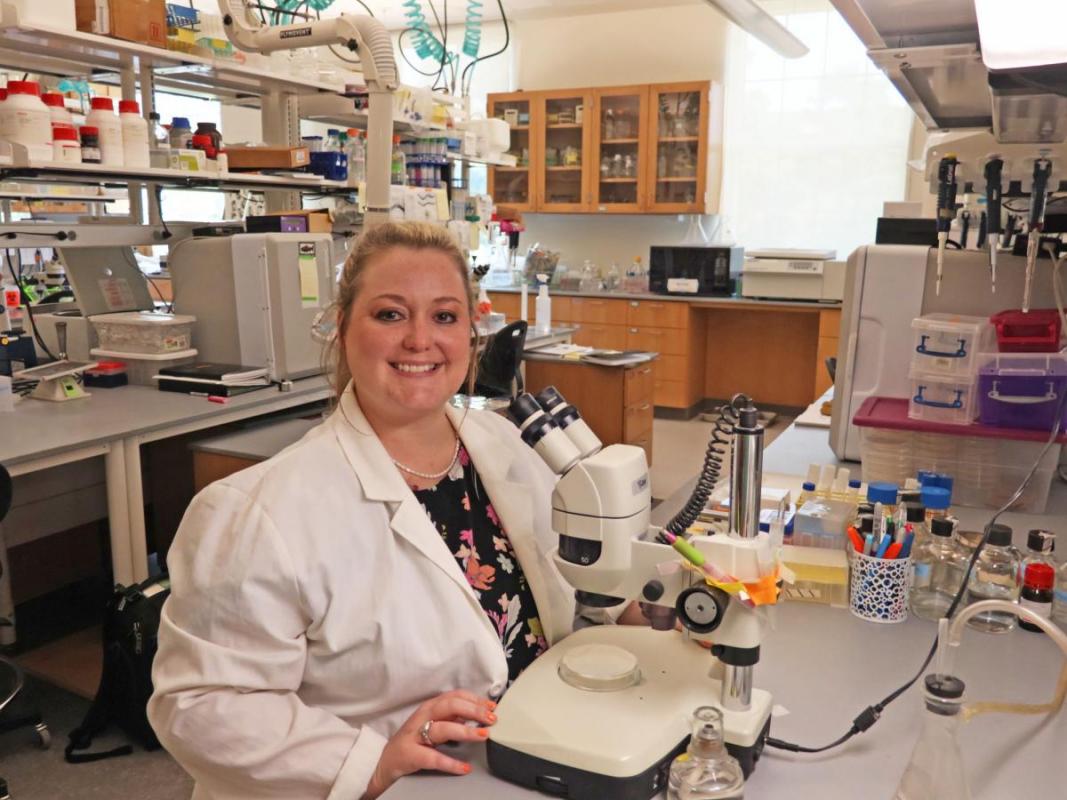

Cell death is natural. More than 50 billion cells in the human body die every day. These deaths stop damaged cells from accumulating and are essential to maintaining health and preventing disease. The most common form of cell death is apoptosis, or programmed cell death. It is necessary for development and normal body function.
“Some of your cells naturally go through programmed cell death, but it is bad to have too much and it is bad to have too little,” says Skylar King, who recently successfully defended her doctoral dissertation in biological sciences. “You have to have this mechanism regulated in just the right way to inhibit cancer or other diseases that are associated with abnormal programmed cell death.”
Abnormal apoptosis is involved in a number of serious conditions including cancer, diabetes and Wolfram syndrome 2, a rare disease, first diagnosed with juvenile diabetes and progressive vision loss. King has conducted most of her graduate research on programmed cell death, including a recent study of a gene mutation seen in Wolfram syndrome 2.
“Our interest in Wolfram syndrome 2 was due to the high occurrence of children, around 6 years old, being diagnosed with an early onset of juvenile diabetes. Then as they get older, there are more severe health issues,” explains Chipo Gray, master’s student in biological sciences expected to graduate in December and co-collaborator on King’s project. “Other diagnosed symptoms include blindness, hearing loss and in rare cases, defective platelet aggregation. Unfortunately, there is no cure, and individuals, around the age of 30, pass due to respiratory failure.”
King and Gray conducted their research under Pamela Padilla, interim associate vice president for research and innovation at UNT and professor of biological sciences, and were supported by a grant led by Padilla from the National Science Foundation. Padilla’s research laboratory uses the microscopic worm C. elegans, to model and study a number of human conditions, including diabetes. While Padilla’s primary research focus is on stress responses, King and Gray expanded these studies to include the stress of abnormal cell death.
“The project is centered around the gene changes that cause Wolfram syndrome 2. The gene family is known as CISD genes,” Gray says. “I worked with research technician Luhua Song to make CISD mutants in the worm and used fluorescent markers to better understand how the genes function and where they are active. Studying the mutations at the DNA level helps us answer some pretty important questions about the disorder.”
King and Gray are the first two authors of the paper, “The CISD gene family regulates physiological germline apoptosis through ced-13 and the canonical cell death pathway in Caenorhabditis elegans” published in the Nature publication Cell Death & Differentiation.
“We confirmed that there is an increase of apoptosis associated with CISD gene dysfunction,” King says. “Then we were able to dissect that this gene family is involved with regulating cell death.”
Mutations in the CISD genes also are linked to breast cancer. King and Gray’s paper demonstrates that the mutations can lead to defects in the regulation of cell death. The findings are significant because understanding the connection between cell death and disease may help researchers find therapies to treat Wolfram syndrome 2, certain types of cancer or other diseases such as diabetes.
King’s grandfather died from complications of diabetes, inspiring her to study potential causes and treatments including apoptosis.
“Over-production or over-regulation of the programmed cell death pathway has been linked to insulin-dependent diabetes,” King explains.
King will start a position this fall as a postdoctoral research assistant at the University of Missouri in Columbia, where she will continue studying the cell death pathway and the CISD gene family with Padilla’s collaborator, Ron Mittler, professor of plant sciences at the University of Missouri, formerly a professor at UNT.
“I am interested in studying how pancreatic beta cells go through programmed cell death. Let’s see if there is a way to perturb that system so they don’t go through as much,” King says. “This could possibly be used in treating diabetes.”